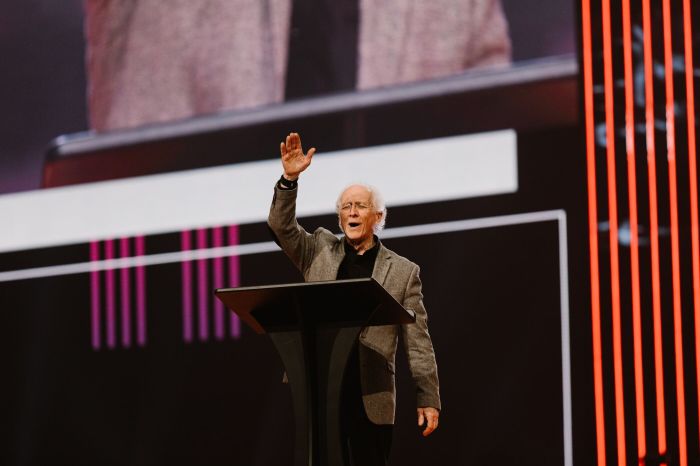
John Piper recently urged Christians, especially teens, not to ask how close they can get to sin, such as mild drunkenness, but instead pursue full clarity of mind and the fullness of the Holy Spirit as the true path to closeness with God.
In a recent episode of his podcast “Ask Pastor John,” the 79-year-old chancellor of Bethlehem College and Seminary in Minneapolis, Minnesota, responded to a question from a Christian teenager asking whether it is sinful to “get a little drunk every so often,” especially if one maintains self-control and doesn’t behave recklessly.
The anonymous teen wrote: “I’m a Christian teenager trying to get closer to God, and I’ve been wondering if getting a little drunk every so often, for fun or to help with some pain, is sinful. When I’ve been drunk, I’ve stayed in control and haven’t done anything bad. I even pray for God’s help in making good decisions. I’ve never been so drunk I forget things or act crazy, and I don’t intend to. Is it still sinful to do this even if I don’t do anything wrong or out of hand?”
Piper affirmed the young listener’s spiritual pursuit: “The most encouraging thing about this question is that this young man says, ‘I’m a Christian teenager trying to get closer to God.’ That’s encouraging because the Bible says, ‘Draw near to God, and he will draw near to you’ (James 4:8).”
But Piper challenged the underlying premise of the teen’s question. Rather than asking if occasional drunkenness is “sinful,” Piper reframed the inquiry: “Are you really asking (or should you be asking), ‘Does getting a little drunk every so often get me closer to God?'”
“Christianity has never viewed drug-induced states as a bona fide way of getting close to God,” he said, contrasting it with some religious traditions that use substances for spiritual experiences.
Citing Ephesians 5, Piper contended that Scripture emphasizes clarity of mind and alertness, traits at odds with intoxication. He read from verses 14–17, emphasizing language such as “awake,” “careful,” “wise,” and understand what the will of the Lord is.
“Do not get drunk with wine, for that is debauchery, but [instead] be filled with the Spirit,” Piper quoted from Ephesians 5:18. “The Holy Spirit is precisely the power of God in you to make you wakeful, and alive, and careful in your observations, and alert in your senses, and wise in your judgments.”
He continued, “The Holy Spirit doesn’t come in to replace human faculties, mental faculties, faculties of observation or thinking, but rather to take them to a new level of spiritual acumen.”
Piper cautioned that seeking spiritual closeness while engaging in even mild intoxication is misguided.
“To be full of the Spirit is to be full of the enjoyment of the nearness of Christ, which Paul says is the opposite of drunkenness because drunkenness dulls the very faculties God has given for the enjoyment of Christ,” he explained.
Piper acknowledged the broader societal consequences of alcohol abuse, like car accidents, workplace losses and broken families, but made clear that his focus was the theological and spiritual disconnect between drinking and drawing near to God.
Piper challenged the teen’s logic by drawing a provocative parallel: “If your desire is truly to draw near to God, you don’t calculate your behavior by asking how close you can get to sin,” he said. “That’s like asking, ‘Is it OK to drive a car when I’m a little bit sleepy?'”
Rather than flirt with sin, Piper said Christians should seek the fullness of the Holy Spirit. “Let’s not ask, ‘How close can I go to sin?’ but ‘How full can I be of the Holy Spirit?'”
He concluded by referencing Galatians 5:19–21, which lists the “works of the flesh” that prevent people from entering the kingdom of God. “You don’t say, ‘Well, can I be a little bit envious? Can I be a little bit angry? Can I be a little bit jealous? … You just don’t ask those questions, not if your goal is really to be as close to God as you can be,” Piper said.
Though perspectives vary across denominations, most pastors agree that the Bible does not prohibit drinking alcohol outright, but it clearly condemns drunkenness.
In a 2012 blog post, evangelist Greg Laurie of Harvest Christian Fellowship in California stated that while he would not dispute someone’s “liberty to drink,” he personally refrains from doing so.
“As Paul told the Corinthian believers, ‘I have the right to do anything,’ you say — but not everything is beneficial. ‘I have the right to do anything’ — but I will not be mastered by anything (1 Corinthians 6:12 NIV),” he wrote. “I don’t want to be under the power of anyone or anything but Jesus Christ!”
Laurie added, “Here’s a revolutionary thought: If you don’t drink, you will never get drunk. If you do drink, you may get drunk. Is it worth the risk?”
Patrick Nelson, president of Dort Theological Seminary in Minnesota, told The Christian Post in 2018 that although “the Bible does not expressly forbid the drinking of alcohol,” it “does forbid us from getting drunk from the drinking of alcohol.”
“Jesus turned water into wine (John 2:1-11) so it’s safe to assume he probably consumed wine himself, which was a custom in his day. However, he was also very adamant about Christians not giving in to drunkenness,” said Nelson at the time.
“Drunkenness and addiction are sins in the eyes of Lord, and its effects can be devastating not only to the person, but those around them as well.”

















